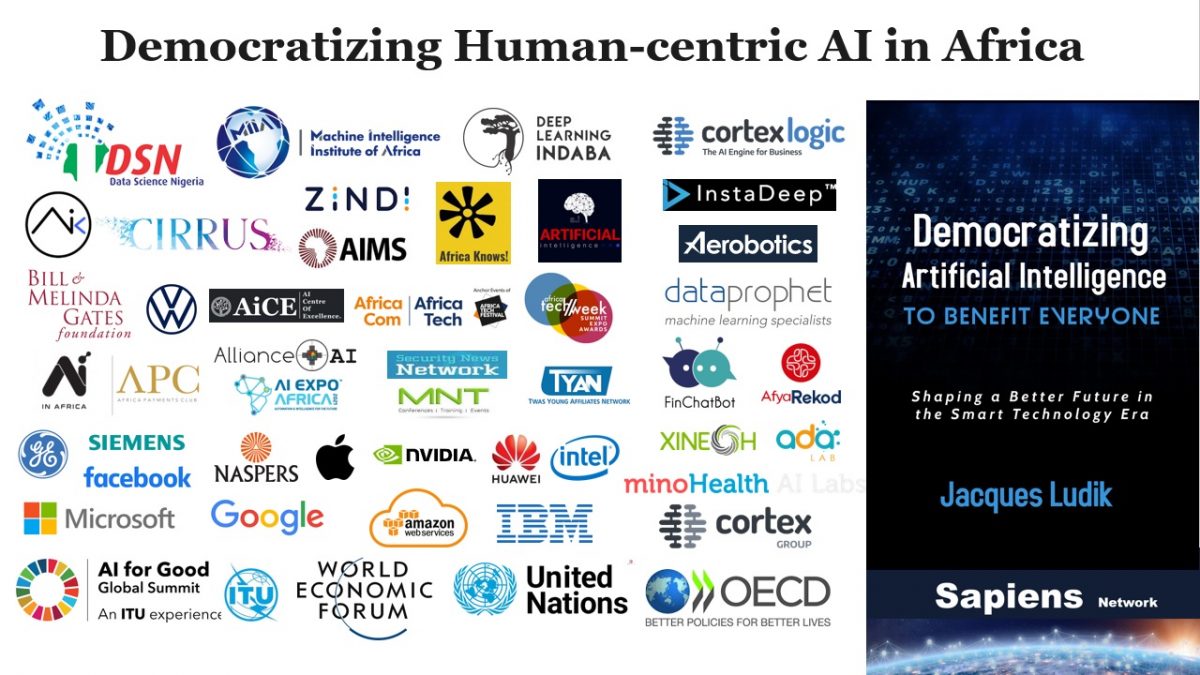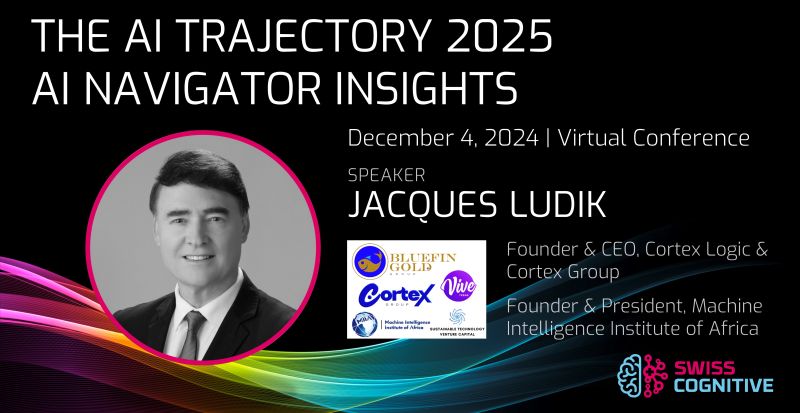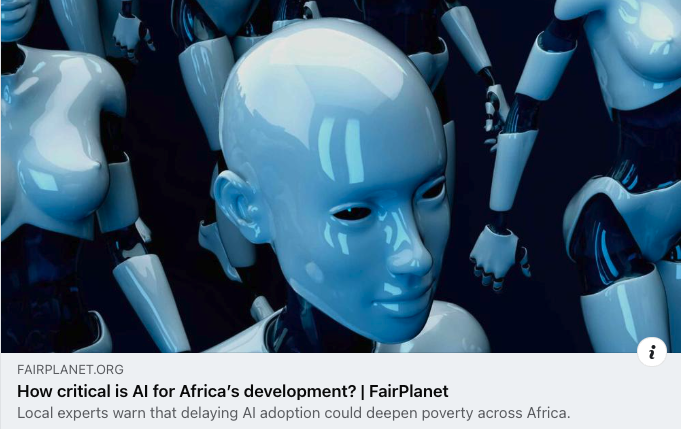Even with AI in Africa being under the radar relative to the world stage and the AI spotlight mostly on North America, Europe and Asia, significant progress has also been made on this continent over the last few years from humble beginnings with the assistance and support from the international community, organizations, and big tech companies along with various purpose-driven and passionate initiatives across private and public sectors and academia to participate and tap into the business, economic, and societal value that smart technology such as AI can help unlock. As mentioned in my recent book Democratizing Artificial Intelligence to Benefit Everyone which is not only a sense-making journey on democratizing AI to benefit everyone, I also reference some governmental AI strategies, policies and adoption as it pertains to Africa as well as private sector initiatives which I will briefly highlight below.
Apart from my recent book, Prof Tshilidzi Marwala, the Vice-Chancellor of University of Johannesburg (with whom I also participated in last year’s National Dialogue on AI in South Africa)also published a book called Closing the Gap that provides an overview of the fourth industrial revolution (4IR) and the impact it is set to have on various sectors in South Africa and Africa. As mentioned in my book, some of the African public sector progress include: “In Africa, Egypt has a national AI strategy that is based on has capacity building and applied research, a national council for AI that drives governance of the strategy and has led the establishment of an African Working group on AI under the auspices of the African Union; Morocco has an R&D Centre specializing in AI and information and communication technologies;[1] Kenya has announced in January 2018 a government task force to create a five-year strategy on national use of emerging technologies; and South Africa has published a report of the Presidential Commission on the Fourth Industrial Revolution in August 2020 that make specific recommendations with respect to investing in human capital, establishing an AI Institute, creating a platform for advanced manufacturing and new materials, securing and availing data to enable innovation, incentivizing future industries, platforms and applications of fourth industrial revolution technologies, building fourth industrial revolution infrastructure, review and amending policy and legislation, and establishing a fourth industrial revolution strategy implementation coordination council.[2] Other AI initiatives in South Africa includes the Machine Intelligence Institute of Africa (MIIA) that was launched in 2016 to help transform Africa through AI and other smart technology as well as the Intsimbi Future Production Technologies Initiative that was launched in 2018 with the goal of advancing South Africa’s manufacturing sector using technologies such as robotics and AI, nanotechnologies and quantum computing.[3] The 4IRSA Partnership in South Africa is another initiative that involves the department of communications and digital technologies, private sector and some universities that aims to stimulate and facilitate an inclusive national dialogue to shape a coherent national response to the fourth industrial revolution in the country.[4] In Nigeria, Data Science Nigeria is committed to raising one million AI talents in 10 years and help to accelerate Nigeria’s socio-economic development through a solution-oriented application of AI in solving social and business problems.[5]“
As a member of the Advisory Board of Data Science Nigeria, I have been fortunate to see Data Science Nigeria growing by leaps and bounds under Bayo Adekanmbi‘s inspirational leadership and setting an example on the African continent on what can be done to advance the Data Science and AI ecosystem in a country. MIIA has also made significant progress with its involvement in the Diffusion of Quality AI in Africa project in collaboration with European universities and funded by the Volkswagen Stiftung as well as its MICT SETA accreditation for Data Science, AI, and other Information Technology training courses in South Africa to help with capacity building in the private and public sector as well as TVET colleges. This complements various Data Science educational initiatives at universities (e.g., Stellenbosch’s University‘s School of Data Science and Computational Thinking) and private sector initiatives such as Explore Data Science Academy, HyperionDev and GetSmarter.
In collaboration with academia, Cirrus is a private sector led initiative (headed up by Gregg Barrett with MIIA also a partner) bringing together academia and industry for the establishment of a world class AI research and application capability for Africa. Although launched in 2019, work on Cirrus started several years earlier which included laying the ground work for WITS University to host the Cirrus infrastructure. Cirrus itself houses the cooperation programs, the state-of-the-art computing infrastructure and the open learning programs, helping to building other businesses through Cirrus FOUNDRY, and the Cirrus FOUNDRY Fund is the in-house fund to support start-ups in the Cirrus FOUNDRY to ensure they are not wholly dependent on outside capital. The WITS university team is led by Professor Zeblon Vilakazi, Vice-Chancellor and Principal, with Professor Emeritus Barry Dwolatzky (project lead), Professor Nithaya Chetty, Dean of the Faculty of Science, as the champion for scientific engagement, and Dr Roy Forbes as the engagement coordinator.
There are also many other notable Data Science and AI success stories such as Deep Learning Indaba, an organisation whose mission is to strengthen Machine Learning and AI in Africa; Zindi, an African data science competition platform (similar to Kaggle) under the leadership of Celina Lee with its growing community of African data scientists solving real challenges; Kenya AI led by Alfred Ongere; AICE (AI Center of Excellence) in Kenyaled by John Kamara; theRunmila AI institutein Ghana lead by Darlington Akogo; the African Institute for Mathematical Sciences (AIMS), Alliance for AIwhich is an Africa AI community led by Alex Tsado, and AI in Africa that aims to empower the youth to design an inclusive future with AI. In other posts I have also highlighted the United Nations, World Economic Forum, Organization for Economic Co-operation and Development (OECD), and the AI for Good Global Summit (see United Nations & Democratizing AI to Benefit Everyone; World Economic Forum and Democratizing AI to Benefit Everyone; OECD and Democratizing AI to Benefit Everyone; AI for Good and Democratizing AI to Benefit Everyone).
Data Science and AI are also extensively used by non-profit organizations such as the Bill and Melinda Gates Foundation in their global initiatives to saves lives and transform livelihoods in the world’s poorest communities especially in Africa. We have also seen significant AI contributions and initiatives here in Africa by some of the world’s leading technology and industrial companies such as Google, Microsoft, Facebook, Amazon, Intel, Nvidia, General Electric, Siemens, and Huawei. Naspers has also been a leading with appreciable investments in African smart technology startups through Naspers Foundry and internationally through Prosus. There are also many AI companies on the African continent that are making their mark such as Cortex Logic (part of the Cortex Group), InstaDeep, Dataprophet, Aerobotics, Xineoh, Finchatbot, minoHealth, Afya Rekod, Ada Labs, and many more. It has also been amazing to see the tremendous increase in Africa AI-related events of the last few years of which MIIA has also been an AI community partner. Some of these includes Africa Tech Week (via Topco), AI Expo Africa (via AI Media), Africa Tech Festival (via Africa Com), Africa Knows!, Artificial Intelligence Conference SA, and AI conferences via MNT Events and Security News Network.
Democratizing Human-centric AI in Africa Project
As an introduction to the “Democratizing Human-centric AI in Africa” project, I am quoting from the Appendix in my book. “As a stepping stone to help democratize human-centric AI in Africa, I am highlighting here a project by the Machine Intelligence Institute of Africa (MIIA) that aims to get not only an accurate dynamic picture about the spread and democratization of human-centric AI in Africa via comprehensive data collection and quality research, but also helping to drive the adoption of AI across Africa continent by engaging in multi-stakeholder, multi-disciplinary research in collaboration with a partner network of excellence. But before I share more details about the project for which MIIA is also requesting sponsorship, let us briefly consider Africa’s tremendous potential to flourish and have better quality life for everyone on the continent as well as the many stumbling blocks that need to be overcome. Taking the proposed Massive Transformative Purpose (MTP) for Humanity and its corresponding goals [as proposed in Democratizing Artificial Intelligence to Benefit Everyone] and implementation seriously would be a key step in the right direction. Another bold step forward would be to implement Sapiens Africa-wide to become Africa’s decentralized human-centric user-controlled AI-driven super platform to empower individuals, companies, communities, and city-states across the continent. We know that Africa is currently the continent with the fastest growing population going from 1.3 billion people to an estimated 2.5 billion people over the next 3 decades and current youth population of 226 million people between ages of 15 and 24. As I have mentioned in Chapter 10 [in Democratizing Artificial Intelligence to Benefit Everyone], the eighth MTP goal is about the need to have a balance in how we grow our populations whilst still maximizing quality of life. If we want to give ourselves the best chance to accelerate the diffusion of quality of life to every African citizen within reasonable time frames, we also urgently need to address the problem of excessive population growth on this continent along with SDGs and other MTP goals outlined.
In a 2020 World Economic Forum article by Colin Coleman from Goldman Sachs it was indicated that if Africa continues and accelerates its structural policy reforms, the region will be worth $5.6 trillion within 5 years (according to McKinsey estimates) and potentially mimic China’s rapid rise of the last 50 years.[6] They also predict that Africa will continue its very strong urbanization path with on average having 24 million more people living in cities each year between 2015 and 2045. Africa’s current economic underperformance, which is a source of global instability and extremism, is demonstrated through the statistic of contributing only 3% to the global GDP with a population that is approximately 17% of the global population. Africa has an opportunity to turn this around and instead become a significant source of growth. Africa Growth Initiative’s Foresight Africa: Top priorities for the continent 2020-2030 report spotlights the successes of previous years as well as strategies to take on impediments successfully to prosper by 2030.[7] Although some progress were made with respect to the SDGs, some of the problems highlighted include not having a robust global and localized governance structure, state vulnerability and large financing gaps, persisting poverty and hunger which is worsen by climate change (and Covid-19), and significant shortcomings with respect to healthcare, education, infrastructure and service delivery. Some of the lessons from Rwanda in making progress towards the SDGs include national ownership and domestication of the SDGs, increasing implementation capacity, resource mobilization and ease of doing business, human capital development and job creation, implementation of the African Continental Free Trade Agreement, and strengthening analytics capacity and monitoring of SDG indicators.[8] Joe Mucheru, has joined a list of global government officials and task forces to fight corruption, provide improved public services to citizens and enhance citizen’s social and economic opportunities.[9] An example of the smart technology deployment that can help with this includes distributed ledger technologies such as blockchain to store data in a way that cannot be changed or hidden to keep people, governments, and organizations honest, ethical, and accountable. Using distributed ledger technologies to store and manage data is like a silent, yet powerful promise to value honesty, transparency, and accountability. Building our AI systems on distributed ledger technologies is an extra way to ensure data integrity and reliability – holding AI for good in high regard. Some of the proposed strategies to address the challenges facing during the smart technology era include fixing the labor-skills mismatch, developing physical and digital infrastructure, and enhancing agile governance for secure and effective management of the fourth industrial revolution and integration into global value chains. Cyril Ramaphosa, President of the Republic of South Africa, has also shared focus areas for the country’s national strategy to harness the fourth industrial revolution which includes responding with agility and purpose to take advantage of the opportunities technological change presents, to enhance South Africa’s global competitiveness in high growth potential sectors such as agriculture, information and communications technologies, electronics, mining, and manufacturing, and preparing citizens as well as protecting them from unfavorable consequences of technology change.[10] As mentioned in Chapter 8, South Africa has published a report of the Presidential Commission on the Fourth Industrial Revolution in August 2020 that make specific recommendations with respect to investing in human capital, building fourth industrial revolution infrastructure, establishing an AI Institute, platforms and applications of fourth industrial revolution technologies, creating a platform for advanced manufacturing and new materials, securing and availing data to enable innovation, incentivizing future industries, establishing a fourth industrial revolution strategy implementation coordination council, and review and amending policy and legislation.[11] As the new African Union chairman, president Cyril Ramaphosa has also requested that Africa establish an Africa Artificial Intelligence Forum.[12] General Electric and the Africa Leadership University has also for example launched another cohort of the Africa Industrial Internet Programme through a $500,000 scholarship funding which is aimed at equipping young Africans with skills that will enable them to take part in the fourth industrial revolution.[13]“
Project Introduction – Democratizing Human-Centric AI in Africa
As introduced in Democratizing Artificial Intelligence to Benefit Everyone (and also referenced at https://miiafrica.org/research/) the “project aims to get an accurate perspective and insights about the democratization and diffusion of human-centric AI in Africa via comprehensive data collection and quality research, whilst helping to drive the adoption of AI on the African continent by engaging in multi-stakeholder, multi-disciplinary research in collaboration with a partner network of excellence. As this project is line with the vision, mission, and objectives of the Machine Intelligence Institute of Africa, this non-profit organization will be acting as a vehicle in collaboration with partners to implement innovative and creative ways of instrumenting the Africa AI Ecosystem so that data can be collected for research, real-time visualization and insights, and actions to help transform Africa through smarter diffusion of human-centric AI, provide guidance to help shape a better and more equitable future for Africans and also become a more meaningful contributor on the global stage with respect to the fourth industrial revolution or smart technology era. The research on the democratization and diffusion of AI in Africa will consist of the interpretation, analysis, reporting, and dynamic visualization of the data collected, as well as developing hypotheses and models, integration and verification of theories, incorporation of complementary interdisciplinary research efforts as applied to African data, presentation of results and insights in digital systems, and the communication of the research outputs via papers and presentations at conferences.
The main purpose of the study is to analyze the state of AI and Data Science in Africa and provide an analysis of constraints to adoption and diffusion building on the business value of AI-based transformation projects. This research project will develop a framework and the systems required for instrumenting the AI ecosystem in Africa, linking key thematic SDG themes and MTP for humanity goals with key dimensions of AI diffusion and providing an accurate perspective and insights about the diffusion of human-centric AI in Africa within the following buckets: (1) Analysis of Africa, African regions, country level analysis and SDGs and MTP goals most relevant to Africa [AI-diffusion, job creation, polarization and economic growth]; (2) Analysis of African entrepreneurship, investment, academia, non-profit organizations [AI-diffusion and entrepreneurship, role of higher education and industry, SMEs]; (3) Analysis of African public sector, governments, academia, non-profit organizations, SDGs and MTP goals [AI-diffusion, security and conflict issues, public procurement, governance, public good]; and (4) Analysis of African businesses across multiple industries [Individual micro decisions on implementation and adaptation of AI by companies and end-users and measuring].
The methodology includes manual mapping (bottom-up) by using our researcher network and partner data sources, websites, LinkedIn posts, physical field visits and engagement with communities in each country and region. Key elements of this work include: (1) Instrumenting the AI ecosystem in Africa through methodologies of innovative multi-layered data collection – wikis, surveys, training, certification, and capacity building effort; and (2) Research and innovation effort, collaboration, and co-creation through understanding the process for AI diffusion, obtaining empirical data, deriving policy implications, and modeling the AI-innovation-productivity link. This study will draw from a pool of submissions by ecosystem members. The aim is to understand the influence of AI across industry sectors and academia (e.g., universities, colleges, research institutions, and schools), business (e.g., corporates, SMEs, and startups), public sector (e.g., national and local governments and policymakers), non-profit organizations (e.g., NGOs, NPOs, communities such as MIIA, Data Science Nigeria, AICE Kenya, Kenya AI, Zindi, MLDS-Africa (Deep Learning Indaba), AIMS, Groups at universities, Meetup Groups, Cirrus, etc.), investors (e.g., Venture Capital and Private Equity), and multi-stakeholder partnerships. It is important to understand how AI drives business value on several dimensions of performance and productivity (at the organizational and process levels). The research process (responding to the research question, making discussions, interpretations and comparisons, and formulating recommendations) will be based on a review of relevant case studies from industry practitioners in the African ecosystem.
The expected results area clear and holistic view of the AI ecosystem in Africa, detailing all the independent elements within the African AI ecosystem; providing multi-layer instrumentation of the AI ecosystem in Africa; and immersion in consortium wide research, enrichment of both historical and nascent research effort, implementation of research across multiple SDGs themes and MTP goals relevant to the African development agenda. The outcomes include doing further research and analysis within the broad spectrum of AI resources in Africa; enriching and substantiating all Africa relevant research being carried out by consortium members, and consolidated efforts; and positioning MIIA as the key entity responsible for the implementation of research being carried out by consortium members. AI covers a wide range of technologies, including machine translation, chatbots and self-learning algorithms, all of which can allow individuals to better understand their environment and act accordingly. The result desired in the context of this work is to stimulate all the recipes that will aid the creation of a vibrant AI ecosystem with the stakeholders that form the basis of building AI success. The intention is to draw from multiple research perspectives across regions in both the developed and the developing world drawing on elements of AI diffusion as follows: the role of higher education and policy to integration of AI education across disciplines; economic growth; job creation; ethics, legal and other social considerations; entrepreneurship and small business adoption; security and conflict; and government, AI and public good. The keyelements of the approach include the following: (1) collaborating deeper and wider and applying key existing findings to address issues like security issues, job creation and employment; (2) collaborating with think tank organizations in areas relevant to the SDGs and MTP goals, understanding the link between Data Science, AI, machine learning and domains such as life science, computer science, engineering, humanities, and economics; (3) understanding the effects of individual micro decisions on implementation and adoption of AI by companies and other end users; and (4) the technology innovation and entrepreneurship domain is also an interesting domain for further research and exploration in the context of this work.
The project plan makes provision for an instrumentation track to collect the data for research purposes and a research track to analyze, interpret, report, publish and communicate the outcome and insights. The email address for funding support and enquiries is info@miiafrica.org. “
Project Plan for Democratizing Human-centric AI in Africa
See also Democratizing Artificial Intelligence to Benefit Everyone or https://miiafrica.org/research/ for more details.






The Machine Intelligence Institute of Africa (MIIA) objectives and initiatives for instrumentation and data collection of the Africa AI Ecosystem:


Get the book: https://www.amazon.com/Democratizing-Artificial-Intelligence-Benefit-Everyone-ebook/dp/B08ZYW9487/
LinkedIn intro: https://www.linkedin.com/pulse/democratizing-ai-benefit-everyone-jacques-ludik
Some video & audio links: https://www.linkedin.com/pulse/ai-perspectives-jacques-ludik
Acknowledgments: https://www.linkedin.com/pulse/acknowledgements-democratizing-ai-benefit-everyone-jacques-ludik/
Websites: https://jacquesludik.com; https://sapiens.network; https://miiafrica.org/books

Background on the Machine Intelligence Institute of Africa (MIIA)
Website: miiafrica.org (or machineintelligenceafrica.org)
Email address for funding support and enquiries: info@miiafrica.org
The Machine Intelligence Institute of Africa (MIIA) is an African non-profit organization founded by Dr. Jacques Ludik in 2016. MIIA aims to transform and help build an AI-powered Africa through a strong, innovative, and collaborative Machine Intelligence, AI and Data Science community, consisting of individuals and key players in the African Artificial Intelligence Ecosystem. MIIA’s growing network consists of stakeholders in the African AI Ecosystem, including thousands of members as well as key decision-makers in NGOs, NPOs, academia, businesses, and the public sector.
MIIA’s vision is to develop a collaborative impactful African AI Ecosystem in collaboration with a global partner network of excellence that helps to transform Africa and shape a better future for all in the smart technology era by:
● growing and connecting an innovative and collaborative community of machine intelligence, smart technology and data science enthusiasts, practitioners, entrepreneurs and experts across Africa;
● certifying and accrediting of AI-related learning, courses, practical experience and skills on an individual level;
● validating & advising on ethical, robust and trustworthy AI implementations at organizations and businesses;
● establishing smart technology centers of excellence across Africa to deliver smart technology entrepreneurs that helps to transform the African business landscape;
● delivering impactful and transformative sustainability development projects across Africa;
● producing significant research and application contributions to improve the state-of-the-art in Smart Technologies such as Artificial Intelligence; and
● mapping and monitoring the growth and impact of the African AI Ecosystem.
MIIA’s mission is:
● to build a strong and innovative smart technology community to help transform Africa by networking together the critical mass of resources, establish smart technology centers of excellence, promote and sponsor learning activities, and strengthen scientific and technological excellence, thought leadership, mentoring and collaboration on the continent;
● to accelerate and deliver breakthrough smart technology related research and practical applications to solve African problems, support entrepreneurial activity, and help drive long-term inclusive and sustainable scientific, technological and socio-economic development on the continent;
● to map and monitor the growth and impact of the African AI Ecosystem; and
● to partner with governments, business, start-up incubators, NGOs, non-profit organizations, universities, and research organizations to support and help mold the future of Machine Intelligence and Data Science research and applications in Africa.
References
[1] https://oecd.ai/dashboards
[2] https://www.gov.za/documents/presidential-commission-fourth-industrial-revolution-members-and-terms-reference-9-apr
[3] https://miiafrica.org/; https://www.holoniq.com/notes/50-national-ai-strategies-the-2020-ai-strategy-landscape/
[5] https://www.datasciencenigeria.org/
[6] https://www.weforum.org/agenda/2020/02/africa-global-growth-economics-worldwide-gdp/ .
[7] https://www.brookings.edu/wp-content/uploads/2020/01/ForesightAfrica2020_20200110.pdf
[8] https://www.brookings.edu/multi-chapter-report/foresight-africa-top-priorities-for-the-continent-in-2020/
[9] http://www.ict.go.ke/blockchain.pdf?fbclid=IwAR1eOduHgOmz_0hOabryFE3Ixi2pDV5fZz5U2GaIakMp6iSlYc_IomXvfbk
[10] https://www.brookings.edu/wp-content/uploads/2020/01/ForesightAfrica2020_20200110.pdf
[11] https://www.gov.za/documents/presidential-commission-fourth-industrial-revolution-members-and-terms-reference-9-apr
[12] https://www.itweb.co.za/content/LPwQ5MlyVpzqNgkj
[13] https://www.africanews.com/2020/02/07/young-africans-benefit-from-500000-scholarship-funding-under-the-africa-industrial-internet-programme/




